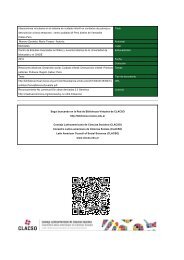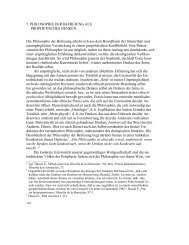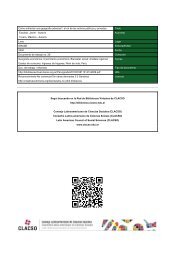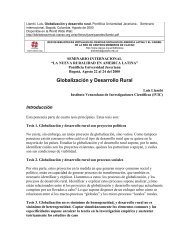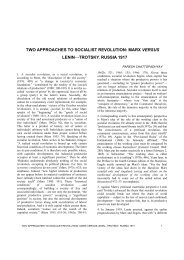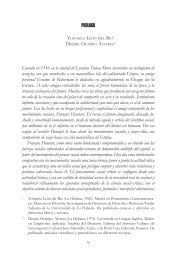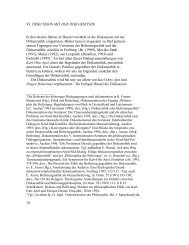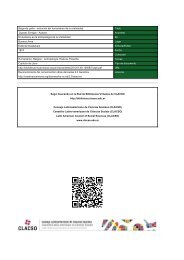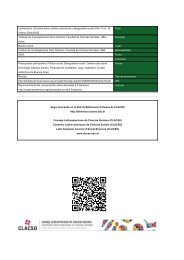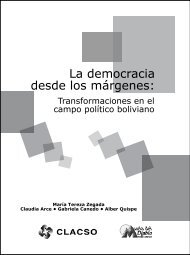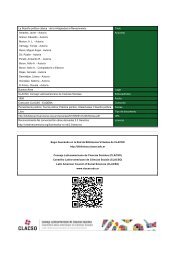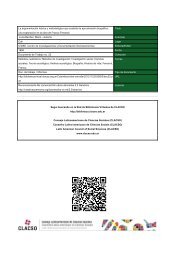1 LOS MACHOS TAMBIEN LLORAN: TELEVISA AND ... - CLACSO
1 LOS MACHOS TAMBIEN LLORAN: TELEVISA AND ... - CLACSO
1 LOS MACHOS TAMBIEN LLORAN: TELEVISA AND ... - CLACSO
Create successful ePaper yourself
Turn your PDF publications into a flip-book with our unique Google optimized e-Paper software.
[Y]ou'd turn your gaze from one side to another, from<br />
Los Angeles to the DF and vice versa, like in a Ping-<br />
Pong game. You couldn't decide very easily which of the<br />
two poles most attracted you; it wasn't ever very clear<br />
to you if the innovations in speech and dress came from<br />
Tepito or from the East Side. (162)<br />
In recent years, the internationalization of capital has<br />
contributed to even greater cultural fluidity: the commercial<br />
"Mexican" music industry, for example, is based in Los Angeles,<br />
and music, films, television, dance and clothing styles flow<br />
easily in both directions across the border. The constant<br />
exchange of cultural style and innovation that Campbell<br />
describes, however, is contradicted by the border's function as<br />
exclusionary apparatus, which has lately increased to the point<br />
of transforming the borderlands into a war zone. Recent U.S.<br />
administrations' commitments to curbing illegal immigration have<br />
encouraged the militarization of border regions; the National<br />
Guard, Marines and Army have been called in to reinforce the<br />
Border Patrol and the DEA, whose "War on Drugs" provides<br />
additional grounds for suspicion and harassment of migrants. In<br />
fact, the Reagan-era Defense Authorization Act of 1982 overturned<br />
a century-old ban on military involvement in domestic law<br />
enforcement; since then, restrictions have further broken down,<br />
and the military has increasingly been used to control crossborder<br />
traffic of goods and people (Palafox 2).<br />
The early 1990s debates over NAFTA clearly brought out the<br />
impossible, contradictory nature of border politics: on the one<br />
hand, the border was to open up, enabling the free flow of<br />
capital and goods; on the other, restrictions on human movement<br />
were to be tightened, with the trade agreement itself being<br />
touted as a remedy for the "immigration problem" by virtue of its<br />
supposed contribution to national economic development. While<br />
arguments against NAFTA often played on stereotypical perceptions<br />
of U.S. workers' xenophobic anxieties, the trade agreement's own<br />
logic implied reinforcement of social and economic divisions<br />
underneath a surface freedom of competition whose actual effects<br />
would be cultural homogenization and--for those who could not<br />
compete--eradication.<br />
In late 1995, the anxieties about border crossing that the<br />
passage of NAFTA was supposed to smooth over erupted once again<br />
specifically in regard to the trucking industry. Although free<br />
passage of commercial cargo trucks within limited zones across<br />
the two nations' borders had been negotiated since 1992 and<br />
written into the agreement that was passed in 1993, the clause<br />
was not to be implemented until December of 1995--at which time<br />
opposition originating on both sides of the border caused it to<br />
be postponed. Mexican shipping company owners and drivers, who<br />
had seen the devastation of the industry in the economic crisis<br />
of the previous year, sought time to prepare themselves for<br />
increased competition from the far-better equipped U.S.<br />
12



